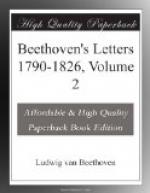[Footnote 1: Schindler relates: “The royal decision (to subscribe for a copy of the mass) was brought to Beethoven by the Chancellor of the Embassy, Hofrath Wernhard. Whether Prince Hatzfeld [the Ambassador] made the following offer from his own impulse, or in consequence of a commission from Berlin, is not known. At all events, the Hofrath put this question in the name of the prince to the great composer, ’Whether he would be disposed to prefer a royal order to the fifty ducats’ [the sum demanded for the mass]. Beethoven replied at once, ‘The fifty ducats.’ Scarcely had the Chancellor left the room when Beethoven, in considerable excitement, indulged in all kinds of sarcastic remarks on the manner in which many of his contemporaries hunted after orders and decorations, these being in his estimation generally gained at the cost of the sanctity of art.”]
[Footnote 2: Schindler relates that Diabelli had refused to let Beethoven again have the MS. of the Sonata, which he had repeatedly sent for when in the hands of the engraver, in order to correct and improve it. Diabelli therefore coolly submitted to all this abuse of the enraged composer, and wrote to him that he would note down the threatened bass aria, and publish it, but would give him the usual gratuity for it, and that Beethoven had better come to see him. On this Beethoven said no more. This Sonata is dedicated to the Archduke Rudolph, and is also published by Schlesinger.]
326.
TO F. RIES,—LONDON.
Vienna, April 25, 1823.
DEAR RIES,—
The Cardinal’s stay here of a month robbed me of a great deal of time, being obliged to give him daily lessons of two or three hours each; and after such lessons I was scarcely able next day to think, far less to write. My continued melancholy situation compels me, however, to write immediately what will bring me in sufficient money for present use. What a sad revelation is this! I am, besides, far from well, owing to my many troubles,—weak eyes among others.
But do not be uneasy, you shall shortly receive the Symphony; really and truly, my distressing condition is alone to blame for the delay. In the course of a few weeks you shall have thirty-three new variations on a theme [Valse, Op. 120] dedicated to your wife.
Bauer [First Secretary to the Austrian Embassy] has the score of the “Battle of Vittoria,” which was dedicated to the then Prince Regent, and for which I have still to receive the costs of copying. I do beg you, my dear friend, to remit me as soon as possible anything you can get for it. With regard to your tender conjugal discussion, you will always find an opponent in me,—that is, not so much an opponent of yours as a partisan of your wife’s. I remain, as ever, your friend,
BEETHOVEN.
327.
TO HERR LISSNER,—PETERSBURG.
Vienna, May 7, 1823.
SIR,—




